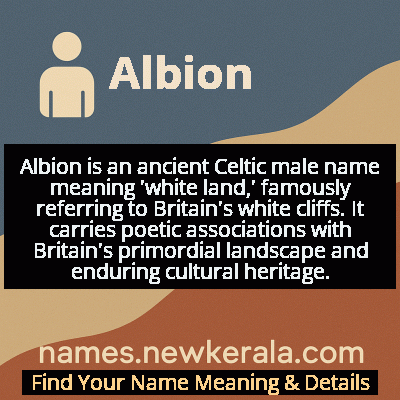Albion Name Meaning & Details
Origin, Popularity, Numerology Analysis & Name Meaning of Albion
Discover the origin, meaning, and cultural significance of the name ALBION. Delve into its historical roots and explore the lasting impact it has had on communities and traditions.
Name
Albion
Gender
Male
Origin
Celtic
Lucky Number
8
Meaning of the Name - Albion
Albion is an ancient Celtic male name meaning 'white land,' famously referring to Britain's white cliffs. It carries poetic associations with Britain's primordial landscape and enduring cultural heritage.
Albion - Complete Numerology Analysis
Your Numerology Number
Based on Pythagorean Numerology System
Ruling Planet
Saturn
Positive Nature
Ambitious, efficient, realistic, and authoritative.
Negative Traits
Materialistic, stressed, confrontational, and can be overly ambitious.
Lucky Colours
Dark blue, black.
Lucky Days
Saturday.
Lucky Stones
Blue sapphire, amethyst.
Harmony Numbers
2, 4, 6.
Best Suited Professions
Business leaders, managers, financial services, law enforcement.
What People Like About You
Leadership, determination, organizational skills.
Famous People Named Albion
Albion W. Tourgée
Lawyer, Judge, Writer
Prominent civil rights activist and Reconstruction judge, represented Homer Plessy in Plessy v. Ferguson
Albion Parris
Politician, Judge
8th Governor of Maine, U.S. Senator, and Chief Justice of Maine Supreme Judicial Court
Albion Woodbury Small
Sociologist, Educator
Founder of the first sociology department in the United States at University of Chicago
Albion Fellows Bacon
Social Reformer, Author
Leading housing reform activist in Indiana, instrumental in passing tenement housing legislation
Name Variations & International Equivalents
Click on blue names to explore their detailed meanings. Gray names with will be available soon.
Cultural & Historical Significance
Throughout literary history, Albion has been used poetically to symbolize Britain's ancient heritage, mystical qualities, and national identity, appearing in works by William Blake, who used 'Albion' to represent the primordial man and the spirit of England in his prophetic books. The name carries connotations of ancient wisdom, mystical landscapes, and the deep-rooted Celtic heritage that predates Roman and Anglo-Saxon influences on the British Isles. In modern times, Albion continues to evoke a sense of ancient British identity and serves as a powerful symbol of the nation's prehistoric roots and enduring cultural legacy.
Extended Personality Analysis
Individuals named Albion are often perceived as possessing a strong connection to tradition, history, and cultural heritage. They tend to be thoughtful, introspective, and deeply rooted in their values, often displaying a wisdom beyond their years. The name suggests someone with a poetic or artistic sensibility, drawn to the mystical and symbolic aspects of life. Albions are typically seen as reliable and steadfast, much like the ancient white cliffs the name references—enduring, majestic, and unwavering in their principles.
They may exhibit leadership qualities combined with a gentle strength, often serving as pillars in their communities or families. Their connection to ancient Britain suggests a personality that values continuity, legacy, and the preservation of meaningful traditions while still engaging with contemporary issues. The name implies a person who bridges past and present, carrying forward ancient wisdom into modern contexts. Albions are often drawn to careers involving history, education, conservation, or the arts, where they can express their deep appreciation for cultural heritage and symbolic meaning.
Modern Usage & Popularity
In contemporary times, Albion remains a relatively uncommon but meaningful choice for boys, particularly among families with British heritage or those drawn to historical and literary names. The name has seen a slight resurgence in recent years as part of the trend toward unique, meaningful names with historical depth. It's most popular in English-speaking countries, especially the United Kingdom, United States, Canada, and Australia, though it remains outside the top 1000 names in most regions. Modern usage often reflects parents' desire to honor British ancestry or express appreciation for Celtic mythology and Arthurian legends. The name appeals to those seeking a distinctive alternative to more common Celtic names like Brendan or Dylan, while still maintaining a strong cultural connection. Its rarity ensures that bearers stand out while carrying a name rich with historical and symbolic weight, making it an excellent choice for parents wanting a name that is both unique and deeply meaningful.
Symbolic & Spiritual Meanings
Symbolically, Albion represents ancient wisdom, enduring strength, and the deep connection between land and identity. The white cliffs imagery evokes purity, resilience, and natural majesty—standing firm against the elements while providing guidance and welcome. In broader metaphorical terms, Albion symbolizes the primordial essence of a people or nation, the foundational spirit that persists through changing times and influences. It carries connotations of mystical landscapes, ancient knowledge, and the continuity of cultural memory. The name suggests a bridge between the mortal and mythical realms, embodying the idea that places and people carry within them the echoes of their ancient origins. In spiritual contexts, Albion can represent the quest for authentic identity and the recovery of lost or suppressed heritage, making it a powerful symbol for personal and cultural renewal and the enduring connection to one's roots and ancestral lands.

